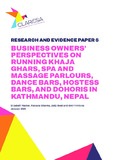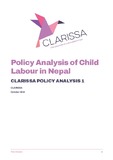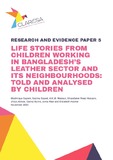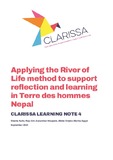Child Labour
Browse by
Child Labour: Action-Research-Innovation in South and South-Eastern Asia (CLARISSA) is a consortium of organisations committed to building a strong evidence base and generate innovative solutions to the worst forms of child labour (WFCL). Together we will explore how to take these to scale and work towards the desired end impact of a decrease in the number of children in the WFCL in Bangladesh, Myanmar and Nepal.
Recent Submissions
-
CLARISSA Cash Plus Social Protection Intervention: An Evaluation
(Institute of Development Studies, 2024-06-21)This paper presents the results of the multi-method evaluation of the CLARISSA Cash Plus pilot, which was an innovative social protection scheme for tackling social ills, including the worst forms of child labour. A universal ... -
Children Discontinue Studies Due to Homelessness and Negligence, or Fall into Substance Abuse
(Institute of Development Studies, 2024-06-21)The CLARISSA Nepal Action Research Group discussed in this report is located in a UNESCO world heritage site, in one of the Durbar Squares in Kathmandu Valley. The location was selected as a cluster for CLARISSA processes ... -
People-driven Solutions: An Introduction to Facilitating Deep Participation for Systemic Change Through Systemic Action Research Programming
(Institute of Development Studies, 2024-06-18)CLARISSA evidence builds upon an existing body of evidence (Burns, 2014; Howard et al., 2021) around deeply participatory processes, where children and adults are given significant decision-making power, and supported to ... -
The Need for an ‘Association’ to Improve Night Entertainment Business Management Practices to Reduce Worst Forms of Child Labour
(Institute of Development Studies, 2024-06-11)In late 2020, CLARISSA undertook scoping studies and literature reviews into supply chain/human chain/urban neighbourhood dynamics in Kathmandu, and their impact on worst forms of child labour (WFCL). To address the evidence ... -
Family Lack of Awareness and Conflict Leads to Abuse and Exploitation at the Workplace
(Institute of Development Studies, 2024-06-17)The Adult Entertainment Sector (AES) is a relatively new and growing sector in Kathmandu, developing rapidly after international aid and trade relations led to the growth of a consumer economy and the development of a ... -
Children Re-enter the Worst Forms of Child Labour Despite Participating in Training and Skills-Oriented Programmes
(Institute of Development Studies, 2024-06-11)Report of the CLARISSA Nepal Action Research Group 4. As the first step of systemic action research, the CLARISSA programme in Nepal collected 400 life stories of children and young people engaged in the worst forms of ... -
A Day in the Life of a Working Child in Kathmandu, Nepal: A Synthesis of 20 Stories about Children’s Days
(Institute of Development Studies, 2024-06-11)This synthesis paper summarises patterns in the lived experience of 20 children in Kathmandu who went about a typical day in their lives. Combining use of Global Positioning System (GPS) technology, a survey children ... -
Child Marriage
(Institute of Development Studies, 2024-06-11)The Child Labour: Action-Research-Innovation in South and South-Eastern Asia (CLARISSA) programme uses Action Research (AR) to understand the dynamics which drive the worst forms of child labour (WFCL), and to generate ... -
Children Discontinue Studies Due to Family Spending on Alcohol and Addictions
(Institute of Development Studies, 2024-06-11)Report of the CLARISSA Nepal Action Research Group 1. This group worked on the theme, ‘Children forced to discontinue their studies as a result of poor economic conditions resulting from family spending on alcohol and other ... -
My Environment, My Work
(Institute of Development Studies, 2024-06-11)The Child Labour: Action-Research-Innovation in South and South-Eastern Asia (CLARISSA) programme uses Action Research (AR) to understand the dynamics which drive the worst forms of child labour (WFCL), and to generate ... -
A Day in the Life of a Working Child in Dhaka, Bangladesh: A Synthesis of 25 Stories about Children’s Days
(Institute of Development Studies, 2024-06-11)This synthesis paper summarises patterns in the lived experience of 25 children in Hazaribagh, Dhaka who went about a typical day in their lives. Combining use of Global Positioning System (GPS) technology, a survey children ... -
Qualitative Analysis of 400 Life Stories from Children and Young People Working in the Worst Forms of Child Labour in Nepal
(Institute of Development Studies, 2024-05-28)CLARISSA (Child Labour: Action-Research-Innovation in South and South‑Eastern Asia) is a large-scale research programme on the worst forms of child labour. It aims to identify, evidence, and promote effective multi‑stakeholder ... -
Informal Economy Perspectives on the Prevalence of Worst Forms of Child Labour in Bangladesh’s Leather Industry
(Institute of Development Studies, 2024-05-16)The CLARISSA programme aims to understand the dynamics that are central to running a business in the informal economy in Bangladesh’s leather industry and explore how and why worst forms of child labour become a feature ... -
Workplace Safety
(Institute of Development Studies, 2024)The Child Labour: Action-Research-Innovation in South and South-Eastern Asia (CLARISSA) programme uses Action Research (AR) to understand the dynamics which drive the worst forms of child labour (WFCL), and to generate ... -
Qualitative Analysis of 405 Life Stories from Children Working in the Worst Forms of Child Labour in Bangladesh
(Institute of Development Studies, 2024-05)The CLARISSA (Child Labour: Action-Research-Innovation in South and South-Eastern Asia) programme is a five-year, action research consortium generating evidence-informed, innovative solutions by children to avoid hazardous, ... -
Bridging Learning and Action: How Did CLARISSA’s Participatory Adaptive Management Approach Foster Innovation, Effectiveness, and Stakeholder Empowerment?
(Institute of Development Studies, 2024-05-31)Child Labour: Action-Research-Innovation in South and South-Eastern Asia (CLARISSA) is an evidence and innovation-generation programme funded by the United Kingdom’s Foreign, Commonwealth & Development Office (FCDO), ... -
Business Owners’ Perspectives on Running Khaja Ghars, Massage Parlours, Dance Bars, Hostess Bars, and Dohoris in Kathmandu, Nepal
(Institute of Development Studies, 2024-02-08)The Child Labour: Action-Research-Innovation in South and South-Eastern Asia (CLARISSA) programme aims to understand the dynamics that are central to running a business in the informal economy of Nepal’s adult entertainment ... -
Policy Analysis of Child Labour in Nepal
(Institute of Development Studies, 2023-10)The Government of Nepal is committed to addressing the issue of child labour and to making Nepal child labour free, as evidenced through continued enactment and implementation of laws, policies, rules, procedures, ... -
Life Stories From Children Working in Bangladesh’s Leather Sector and its Neighbourhoods: Told and Analysed by Children
(Institute of Development Studies, 2023-11-06)CLARISSA (Child Labour: Action-Research-Innovation in South and South-Eastern Asia) has a participatory and child-centred approach that supports children to gather evidence, analyse it themselves and generate solutions to ... -
Applying the River of Life Method to Support Reflection and Learning in Terre des hommes Nepal
(Institute of Development Studies, 2023-09)The RoL method is a visual narrative method that helps people tell stories of the past, present, and future. Individuals can use this method to introduce themselves in a fun and descriptive way. A group can use it to ...




















